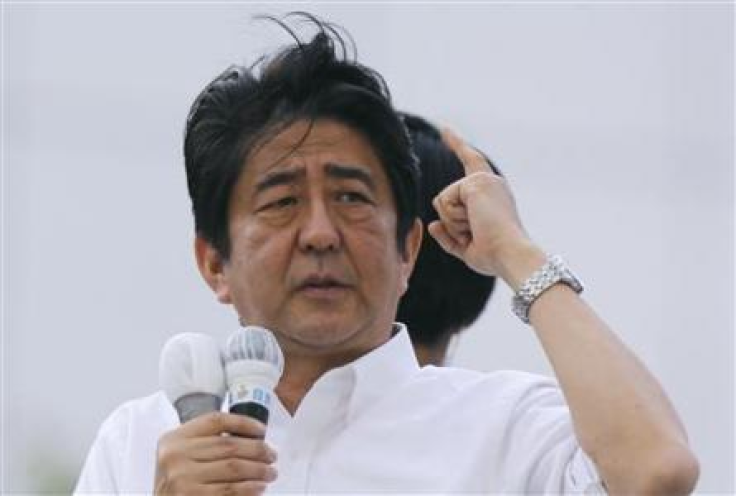Abe Coalition Projected For Major Win, Concerns Regarding Economic Reform And Relations With China And Korea Already Surfacing

Japanese Prime Minister Shinzo Abe won a convincing victory in the upper house election on Sunday, but concerns are already surfacing that the landslide win may weaken his resolve to solidify Japan's economic recovery, and cause the prime minister to shift focus to recasting Tokyo’s World War II history, which would further fray relations with China and South Korea.
Abe’s Liberal Democratic Party and its coalition partner New Komeito will win at least 71 of the 121 seats today, according to Bloomberg, which will give the coalition a majority in the 242-seat upper house and control of both houses for the first time since 2007. Abe will not need to face another election for three years, which should usher in a period of stability after years of weak, short-lived governments.
Abe’s economic reform, termed “Abenomics,” is popular, and gaining control of the upper house will give him more leeway to carry out the third strand of his economic growth strategy aimed at boosting private investment.
Since Abe’s rise to power, unprecedented monetary easing and 13.1 trillion yen ($130 billion) in stimulus spending has helped push up the Nikkei share average about 4 percent and weakened the yen, Bloomberg reported.
The worry now is that the size of the LDP-led coalition victory could weaken Abe’s resolve to continue to push ahead with economic reform in the face of opposition to deregulation from LDP lawmakers with close ties to industries that would suffer from change. Abe has made reassurances that he will remain focused on fixing the economy with a mix of hyper-easy monetary policy, fiscal spending and a growth strategy including structural reforms, and LDP leaders repeated that pledge on Sunday, according to Reuters.
Experts have called for Abe to cut corporate taxes, loosen labor regulations to make it easier to fire workers and tackle the world’s largest debt, but Abe will need to walk a fine line to avoid disappointing investors with tepid measures, or sparking dissent among allies. Bold moves are unlikely to gain support.
“We’re not going to see anything dramatic,” said Robert Feldman, head of Japan economic research at Morgan Stanley MUFG Securities Co., according to Bloomberg. “It’s not flashy stuff, it’s small step-by-step actions.”
The other cause for concern is that Abe may shift focus to fulfill his long-held ideological aims by revising Japan’s pacifist postwar constitution without having to secure cooperation from opposition parties.
Abe, an advocate of a stronger military and more assertive diplomatic policy, has in recent weeks stepped up rhetoric against China over a territorial dispute that has frozen bilateral ties. Last week, he visited a Self-Defense Force base close to Japanese-controlled islands in the East China Sea also claimed by China, to express support for his troops, according to Bloomberg.
A firmer stance toward China and South Korea, where bitter memories of Japan’s past militarism run deep, could further fray the already strenuous ties with the countries, and may prove to be an unpopular move for Abe.
"I have the impression that Prime Minister Abe wants to revise the constitution, though I don't think it will be easy," said apparel firm employee Etsuko Yamada, 35, who voted for the opposition Japanese Communist Party, according to Reuters. "I want him to show Japan's presence through diplomacy with strong negotiating power, not though military power by spending money to rearm."
Abe has declined to say whether as premier he will visit Tokyo’s Yasukuni Shrine for the war dead, which also honors Japanese leaders convicted by an Allied tribunal as war criminals during World War II. A visit on the Aug. 15 anniversary of Japan’s 1945 defeat could spark outrage in the region, Reuters reported.
The exit polls showed, however, that the coalition will fall short of the two-thirds majority needed to take revisions of Japan’s pacifist constitution to legitimize the military to a public referendum.
© Copyright IBTimes 2024. All rights reserved.











